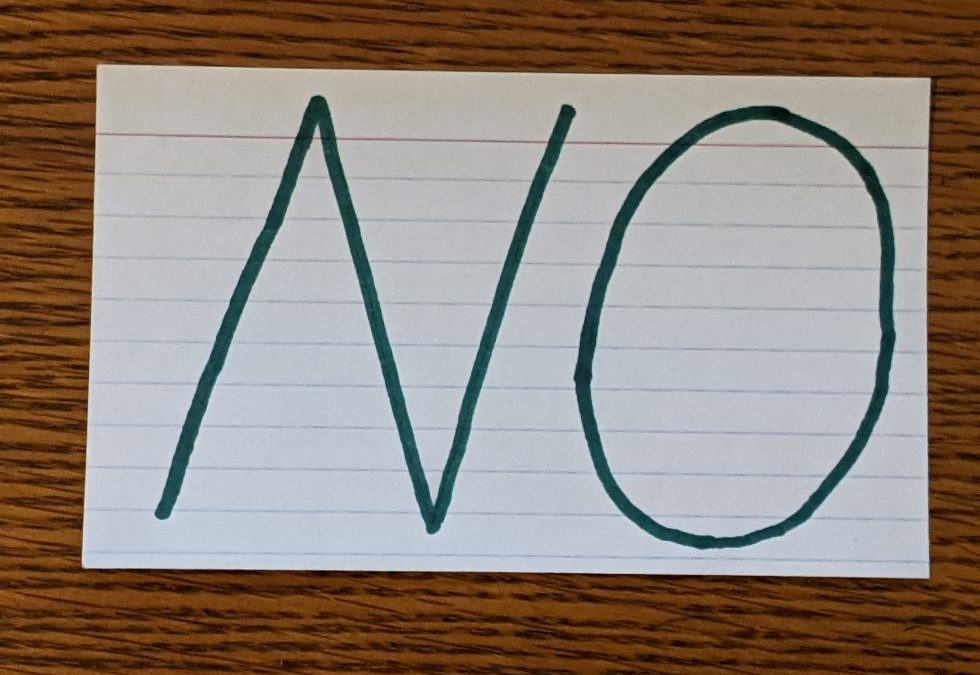It’s only two letters, but “no” can be a hard word to say.
There are lots of reasons it’s hard to say no, particularly for members of Team Toolkit. We’re an enthusiastic, positive, and curious bunch. We love trying new things and are committed to building a culture of generosity. We love helping people, we sincerely enjoy the work, and we explicitly bring a “Yes, And…” mentality to all our activities. So when a new request comes in, when someone reaches out and asks for our time and attention, our natural inclination is to say yes.
But sometimes, yes is the wrong answer. Sometimes we need to say no. And that’s hard.
Difficult or not, it’s super important to turn down some requests. A discipline of saying no helps us stay focused on the most important, impactful work, and do it in a sustainable way. It prevents us from getting burned out, overcommitted, or spread too thin, from doing work that is not a good fit, or from being distracted from our actual mission. But even though it’s good and important to turn down some opportunities, it’s still not easy to do.
Why is it so challenging? Well, sometimes we feel guilty about saying no, like we’re letting people down by not accepting the invitation. Other times we feel scared, because we’re not sure how the other person will respond or how the decision might impact our career. Saying no can feel like a contradiction to our fundamentally positive character. And of course there’s also FOMO – the fear of missing out, particularly when the thing we’re saying no to sounds like it would be a positive opportunity. It’s tough to say no when a big part of you wants to say yes.
Here are a few techniques that help me in this area:
Do it quickly. Don’t leave the other person hanging for too long – that’s not nice to them, and the longer we delay, the more pressure we feel to say yes. Plus, delaying a decision just eats up the time we’re trying to protect by saying no in the first place.
Set boundaries in advance. Create a little rubric to help filter incoming requests. Just as a plumber should turn down a customer’s request to do electrical work, we decline invitations that don’t require our tools and specialties. For example, if someone asks us to simply run a meeting, we say no. That’s not the kind of facilitation we do.
Don’t offer an explanation. “No” is a complete sentence, and it is perfectly legitimate to say, “Sorry, I can’t do that.” Other variations might include “I’m not available” or “That’s not a good fit.” Resist the urge to give a detailed explanation of why you can’t do it, why it’s not a good fit, or what higher-priority activities you’re already committed to. You’re making a decision, not starting a debate.
Do offer an alternative. Depending on the nature of the request we’re declining, we may be able to suggest a different option. Something like “I’m not available tomorrow but I’m free next Thursday.” Or “I’m not available but maybe Rachel is.” Of course, you can still say no even if you don’t have an alternative, but it helps both parties if you can offer a Plan B.
Don’t negotiate with yourself. Avoid saying stuff like “I can’t do it tomorrow unless you really need it ok maybe I can, just hold on while I rearrange my calendar…” Before you turn your no into a yes, give the other person a chance to accept the first answer. And if they do come back and ask again, you can still hold on to your first “no.” You knew what you were doing when you said it the first time.
One final observation: Saying no takes practice. Just like all hard things, we get better at it the more we do it. So you’re invited start with just one “no” this week and see what happens. We’d love to hear how it goes!


Such an important topic! Two amazing books on this topic are The Power of Positive No by William Ury and Necessary Endings by Dr. Henry Cloud – both highly recommended.
Thanks Harry! So glad you liked it, and thanks for the book recommendations! I’m a big fan of Dr Cloud & read his book already, will have to check out Ury’s book too!